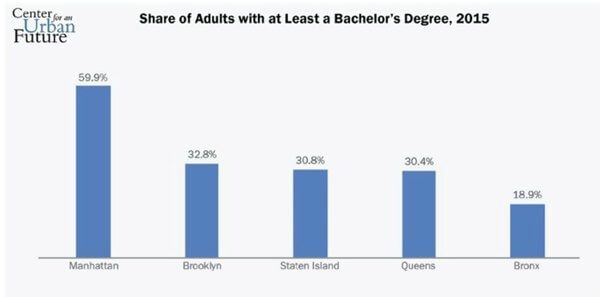By Naeisha Rose
The non-profit research organization Center for an Urban Future has released a study in which it found too few students from Queens and across the city graduate from both community and four-year colleges in the CUNY system on time or leave without credentials, based on graduation data from 2010 to 2017.
At LaGuardia Community College in Long Island City and Queensborough Community College in Bayside, only 22 percent of students at each school completed an associate’s degree within three years, according to the study based on 2013 graduation data.
The CUNY system has 11 senior and comprehensive colleges, schools with both associate’s and bachelor’s degrees, and of those schools 2010 data showed only one — Baruch College in Manhattan — as having a graduation rate of over 70 percent within six years.
While Queens College in Flushing had the second highest graduation rate, it fell short of the 70 percent mark with only 64 percent of students obtaining degrees in six years, according to the data. York College fared worse with only 41 percent of its students obtaining a degree within the same time period. Baruch, which topped the list, had a 71 percent graduation rate.
The study also looked at data from the 2011-2015 U.S. Census Bureau. According to the bureau’s American Community Survey five-year estimates, only 30.4 percent of adults 25 and older who live in Queens had a bachelor’s degree by 2015. This placed the borough fourth in the city, leaving it only ahead of the Bronx, where 18.9 percent had a four-year degree
Manhattan residents headed the list with 59.9 percent in bachelor’s degree attainment, Brooklyn came in second with 32.8 percent, and Staten Island was third with 30.8 percent achievement.
Major contributing factors for the lack of a degree within three to six years was low-family income and poor college readiness, according to the study released Dec. 5.
According to the study, the students who struggled to complete a degree on time often came from a family making less than $31,000 or were lacking guidance on how to navigate college life academically and socially.
In terms of finance, 2016 data showed 64 percent of Queensborough students had families who earned less than $31,000, while 51 percent of Queens College students faced the same challenges. When it came to college readiness, school counselors who help to guide incoming students only made up 2.3 percent of a school’s budget.
CUNY schools also have a majority of minority students, according to the study. Students of color make up 85 percent of its community colleges and 79 percent of its four-year colleges.
Tom Hillard, the economic fellow who authored the report, said the lack of degree completion within six years is troubling, especially as attaining one has now become the basis for economic success in the 21st century.
“If New York is serious about reducing inequality and helping more residents get on the path to the middle class, we absolutely need to address the city’s college success problems,” said Hilliard. “CUNY has made some important progress in improving graduation rates in recent years, but there’s still an enormous problem when nearly eight in 10 students at the city’s community colleges fail to earn an on-time credential.”
Freddi Goldstein, the mayor’s press secretary for education, however, noted his administration is and will continue to make big investments in CUNY schools to help them improve.
Investments from his office will help the Accelerated Study in Associate Programs initiative at CUNY, which served 4,000 in the 2014-2015 school year, serve 25,000 in the 2017-2018 school year, according to Goldstein.
The ASAP expansion will focus on STEM-majors, according to the mayor’s office. The ASAP program has also graduated 50 percent of its students within three years.
For fiscal year 2018 the city will invest $169 million in CUNY community colleges, which will grow to $213 million in 2021, said Goldstein.
Goldstein said four other CUNY programs will receive $10 million by fiscal year 2019. This includes the CUNY Start Math Expansion geared to 4,000 prospective students interested in STEM, professional career development in the NYPD through the Academic Preparation Program for Law Enforcement Corps, CUNY Prep for out-of-school youth and the Fatherhood Academy at LaGuardia for young adult fathers 18 to 24, which provides GED prep, college exploration and job workshops.
“This administration has dedicated significant resources to helping New Yorkers obtain a degree from CUNY, including greatly expanding the ASAP program, which has more than doubled associate degree completion rates for participating students,” said Goldstein.
Reach reporter Naeisha Rose by e-mail at nrose

































